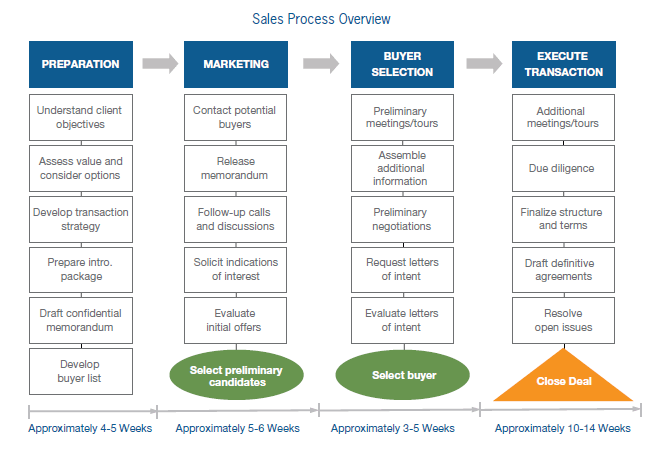Successfully Selling Your Business: Preparation and the Process
Successfully Selling Your Business: Preparation and the Process
Business owners contemplating an ownership transition at some point in the future should carefully consider certain actions to ensure their business will attract strong interest and full valuations from a range of buyers. Furthermore, business owners will have the most favorable outcome when they understand the steps in the sale process, the roles played by the management team, investment banker, and legal counsel, as well as the time and commitment required. The following article explores presale preparation considerations and the sale process, with the goal of providing a useful framework for business owners as they evaluate eventually selling a business.
Preparation Prior to a Sale Process
Prior to commencing a sale process, business owners should review the Company’s operations, financial reporting, and legal situation to identify and address any issues that may harm the process or negatively impact value. There are simple steps that can be taken to improve the presentation of the business.
Financial Considerations
From a financial reporting standpoint, business owners should have their outside accountants assist with a rigorous review of the quality of earnings, reserve methodologies, and other accounting policies. Balance sheet accounts should also be reviewed to determine if assets reflect their true market values. Buyers have significantly increased their due diligence efforts relative to the financial statements of a business. Buyers want to ascertain the GAAP-compliant, sustainable cash flow (EBITDA) generated by the business as it is currently configured and assess the major risks that could impact cash flow. A simple checklist for business owners is as follows:
- Audit financial statements
- Prepare detailed monthly budgets/projections
- Clean up balance sheet (write off uncollectible accounts receivable, sell or write off obsolete inventory, pay overdue payables)
- Evaluate quality of earnings (adjust/eliminate nonrecurring items, discretionary spending, aggressive accounting policies, etc.)
- Develop systems to track key operating metrics (these will help to highlight key value drivers of the business such as revenue and margins by end market, key customers or other key factors)
- Appraise value of tangible assets (real estate, large equipment)
- Identify customer or supplier concentration and develop mitigation plans
- Taxes (evaluate a stock versus asset sale impact)
Legal Considerations
The legal aspects of a business are frequently overlooked by business owners, but they are very important, particularly if the business employs critical intellectual property. The legal elements of a business may materially affect the marketability or value of a business. Legal items to review during this preparation phase include:
- Obtain all necessary permits and certifications
- Confirm all contracts and agreements are valid (assess ability to assign to new owner)
- Review all regulatory compliance
- Make sure all patents and trademarks for IP are in order n Comply with all software license agreements n Identify and evaluate all outstanding litigation and claims n Maintain proper business insurance n Identify any consents that may be required in a transaction
Operations Considerations
Management should consider fine tuning certain areas of the operations prior to a sale process. Many operations issues pertain to making sure the business can function properly.
- Evaluate management structure (strengths, weaknesses, retention concerns)
- Document key production/process procedures and quality control
- Evaluate IT capabilities in comparison to current industry standards
- Detail engineering or R&D activities
- Update website to permit customer interaction and ease of use
- Evaluate ongoing capital expenditure requirements
- Clean up the facility (discard obsolete equipment and inventory and clean/repair as needed)
The preparation as discussed above may take one to two years depending on the degree of work required to properly position the business for sale. After a full review of the financial reporting, legal aspects, and operations has been conducted and steps are implemented to augment the business or to minimize any issues, then the business should be well positioned to embark on the sale process.
Sale Process
Preparation
The first phase of the sale process is the preparation phase. The primary objectives are completing investment banker due diligence, developing the confidential materials to be distributed to potential buyers, and defining the buyer universe. This phase typically takes four to five weeks. Prior to a kick-off meeting, the investment banker will provide to management a detailed discussion and report outline to help foster the due diligence discussion and assemble the information to be conveyed to buyers (either to educate early in the process or for confirmatory due diligence late in the process with the selected buyer). At the kick-off meeting, the investment banker will spend a day with management conducting due diligence, learning the “story,” and helping management appreciate the magnitude of the topics, questions, and supporting reports that will be addressed and required by buyers during the process. The investment banker will channel the copious notes and assemble information and the “story” into a Confidential Memorandum (CM) that will be instrumental in educating potential buyers of the unique attributes of the business. It is important to clearly convey the attributes, as it is the interaction of the attributes that creates a competitive advantage and enhances the value of the business. The investment banker will turn drafts of the CM with management until both parties believe the required information is correct and the “story” is succinctly captured. Simultaneously, the investment banker will develop, with management’s input and industry insight, a well-defined buyer universe and a strategy to approach each buyer. In general, the preparation phase requires a modest amount of management’s time, except for the CFO or point person who will actively coordinate the information flow to the investment banker and work closely on the financial information to be included in the CM and the supporting detail. With the completion of the preparation phase, the investment banker launches the marketing phase.
Marketing
The second phase of the sale process is the marketing phase. Marketing’s primary objectives are to communicate with interested parties the merits of the business and solicit valuation feedback from the marketplace. The marketing phase typically requires five to six weeks. During the marketing phase, the investment banker contacts each potential buyer following the strategy agreed to with the management team. The investment banker will provide the highlights of the business and “story” on a no-name basis to assess preliminary interest. Prior to distributing a CM, the potential buyer will sign a non-disclosure agreement (NDA). The investment banker follows up with calls to the potential buyer to answer questions and continue to sell the “story.” Toward the end of this coordinated marketing campaign, the investment banker will provide each potential buyer an instruction letter asking for an Indication of Interest (IOI) on a certain date. Potential buyers who remain interested and want to pursue the opportunity will submit an IOI that states:

i. a range of value;
ii. key due diligence areas to be further discussed;
iii. financing sources;
iv. any conditions to closing the potential buyer may have, and
v. other issues such as expectations relative to management and employees and estimated time required to close a transaction.
The investment banker will gather the IOIs, clarify any aspects of the IOI that are unclear, and discuss each IOI in isolation and in comparison with the business owner. The investment banker and business owner determine which potential buyers are the best to invite to management presentations (the third phase of the sale process). Factors that influence the decision to invite potential buyers include: valuation range, reputation, financing sources/likelihood of closing a transaction, due diligence, or other issues raised by the potential buyer. Although each situation can vary, ideally four to six quality potential buyers are invited to the next round to meet with the management team and learn more about the business.
Buyer Selection
Buyer selection is the next phase of the sale process. Buyer selection usually will require three to five weeks with the final outcome the execution of a Letter of Intent (LOI). The buyer selection phase focuses on management presentations whereby the management team has the forum to walk potential buyers through the nuts and bolts of the business and, more importantly, share their vision of the business and the upside of the business with the buyers. Each potential buyer will join management and the investment banker in a management presentation that is designed to be interactive as well as a tour of the plant or facility to allow the potential buyer to better understand the operations. Often, each visit closes with a dinner, enabling the potential buyer and the business owner and management team to discuss the business prospects in a more relaxed fashion. Additionally, the dinner setting allows the parties involved to appreciate the character of the counter-party. At the conclusion of all of the potential buyers’ visits for a management presentation, the investment banker will forward to potential buyers an instruction letter outlining the terms to be covered in an LOI and a due date for submitting the LOI. The LOI should be specific and highly detailed, covering the following items:
i. valuation/price;
ii. due diligence items and expected timing;
iii. precise capital structure and sources of financing;
iv. intent regarding management, employees, and operations;
v. legal terms such as indemnification caps, baskets; survival periods, and escrows, and
vi. proposed closing date.
The investment banker and legal counsel will work to clarify the LOI and negotiate on behalf of the business owner to improve some or all of the terms. The investment banker and business owner will continuously compare the various LOIs and, based on the items that are most important to the business owner, select an LOI to finalize and execute.
Execute Transaction
The final phase of the sale process is executing the transaction. The primary objective of this phase is to document the terms of the LOI in the Purchase Agreement (PA) and related legal documents, complete buyer due diligence of the business, and fund and close the transaction. This phase can require 10 to 14 weeks to complete. Frequently, buyers will hire an accounting or transaction services firm to conduct accounting due diligence. The focus of this diligence is to ascertain the soundness and consistency of the accounting policies employed. The buyer is confirming the numbers that have been provided by the seller are not artificially inflated to increase EBITDA or whether there are certain inherent risks to the business that were not previously disclosed. Simultaneous to the accounting due diligence, buyers will engage lawyers to review contracts, intellectual property, permits and licenses, and other legal-oriented facets of the business. In addition, in many cases, the buyer will retain an environmental consultant if the business involves land or potentially hazardous or environmentally unfriendly materials. Following the completion or near completion of the due diligence, the buyer and seller will begin to document the transaction through the PA and related legal documents. The legal counsel and investment banker will work through the documents and advise the business owner on the terms and conditions that are set forth in the PA. When the PA is finalized and all necessary consents are granted, the transaction is closed and funded.
Conclusion
Proper preparation and a well-orchestrated sale process can increase the probability of a successful outcome to the sale process at the highest possible value. It is in the business owners’ best interest to methodically assess their business prior to the sale process. The objective is not to transform the business, but to address the potentially unattractive issues that may limit interest or value. Problems that arise during a sale process can often be traced to certain areas of the business that were not adequately prepared prior to the sale process. The investment banker will actively manage the sale process by working with the management team on the marketing materials, including the CM, engaging with potential buyers to illustrate the compelling attributes of the business and share the “story,” as well as collaborating with the legal counsel and other parties to execute the transaction. The sale process involves a large number of moving parts, some of which are not in the control of the business owner, management team, or investment banker. The investment banker will act as the business owner’s guide and stabilizing force in these matters.



